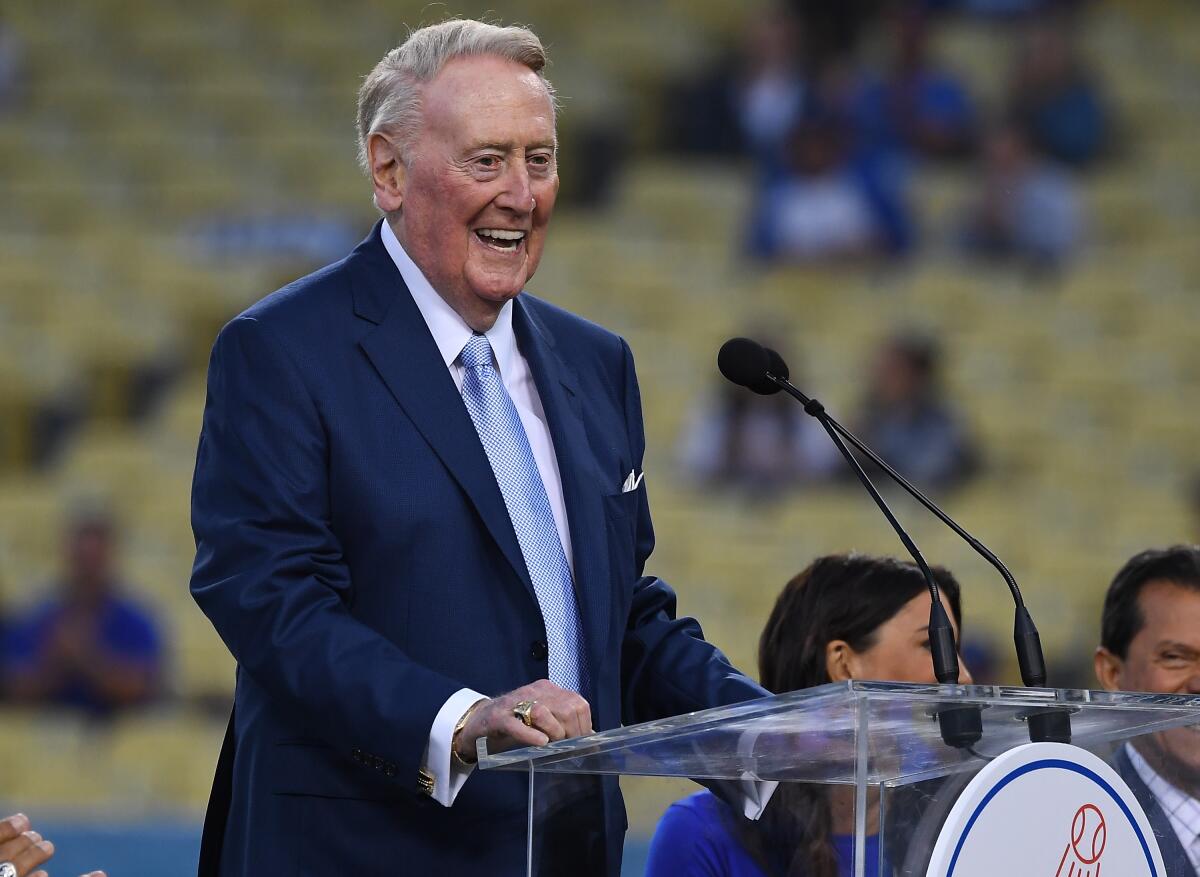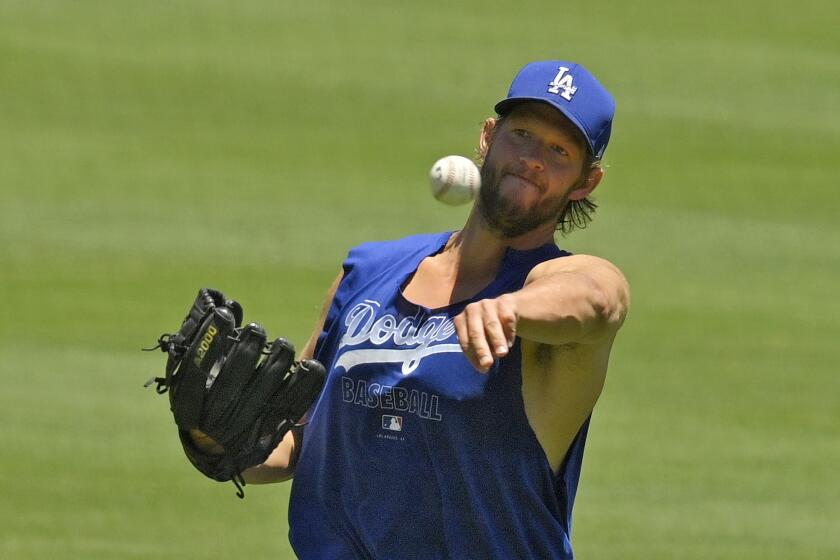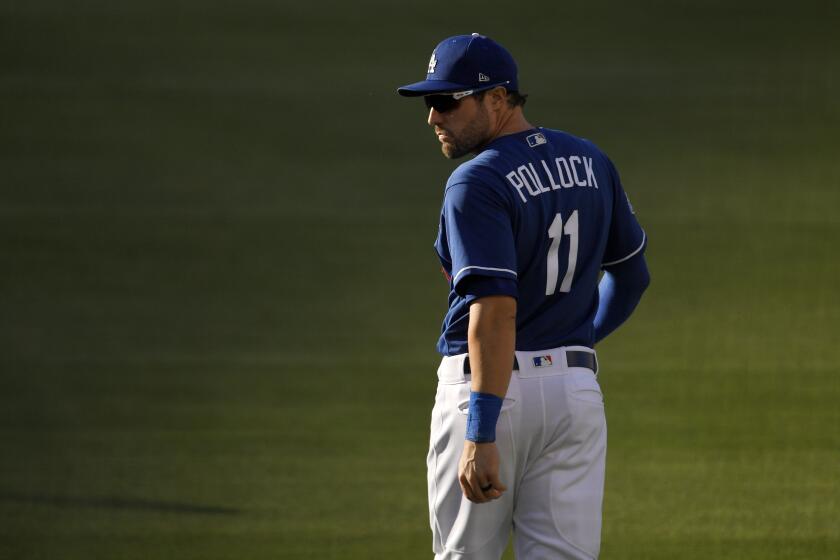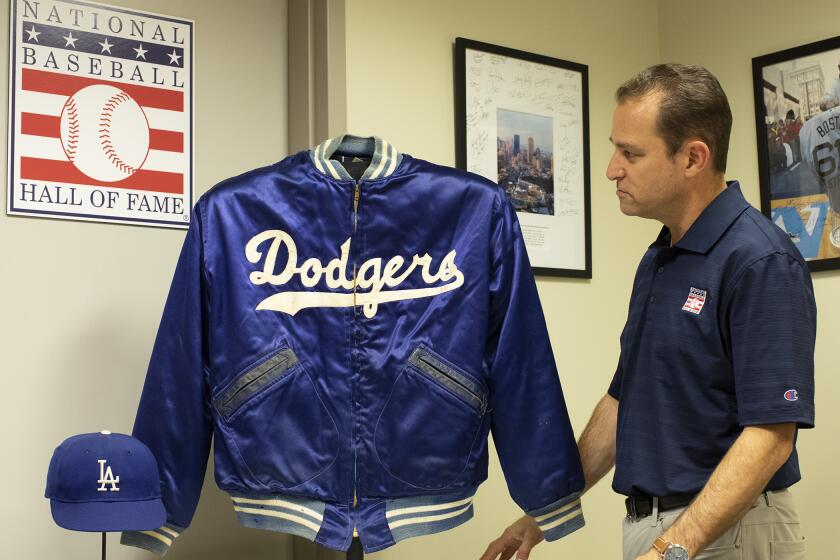How Vin Scully and the Dodgers faked crowd noise 52 years ago
- Share via
Crowd noise, without the actual crowd.
That’s what baseball broadcasts will feature this season, presented as if it were a cutting-edge concept. It is not. The Dodgers did it 52 years ago. They just didn’t advertise it.
On March 23, 1968, the Dodgers played an exhibition in the Bahamas. With broadcast transmission facilities unavailable in Nassau, Vin Scully skipped the trip and called the game from the Dodgers’ spring home in Vero Beach, Fla.
“I decided that, since we were going to broadcast it, I would fake it to the nth degree,” Scully said.
He got a book on the Bahamas and read from it during the game, as if to share how he had experienced the local culture. A Dodgers publicist phoned in descriptions of every play, and team staffers typed them and fed them to Scully and partner Jerry Doggett, who jazzed up the words and turned them into play-by-play.
Ten Dodgers, including Clayton Kershaw and Cody Bellinger, appeared in a video pledging to raise funds for social justice causes through the ‘In This Together’ campaign.
And, yes, the broadcast included crowd noise, from tapes of previous games.
“I have different tapes for doubles, singles, great catches, and even an ‘ugh’ when a batter is hit by a pitcher,” sound engineer Monty Bancroft said, according to the Los Angeles Herald Examiner.
Amid the hits and outs, Scully sprinkled in descriptions of the various tourist spots he claimed to have visited that morning. The Dodgers won the game, and the broadcast went off without a hitch.
“I never let on anything,” Scully said. “However, about two days later, I got a letter from a woman, and she said she was the head of the bird watchers of America, and she said, ‘Mr. Scully, it was so exciting for us to hear the game, because we could hear a red-throated swallow,’ or whatever it was. She was so thrilled about the fact that she had heard this rare bird in the Bahamas.
“And, of course, that was the tape from Florida.”
The retired Scully, 92, widely regarded as the finest broadcaster in baseball history, said he is looking forward to watching the games this season. Broadcasters are not scheduled to travel in this pandemic-shortened season, so Joe Davis and Orel Hershiser will call games off television monitors in Los Angeles when the Dodgers are on the road.
Scully said he could not recall calling a game off a monitor, where broadcasters can see the game even if they are not on site. He did recall broadcasting off a ticker, which meant describing a game that he could not see at all.
He would get a bare-bones description from the Western Union ticker, essentially a primitive form of a text message. It was his job to enliven “strike three” into something like this: “The 2-2 pitch: Newcombe into the windup, fastball, swung on and missed, strike three!”
If the ticker stopped, the broadcast did not.

“If the unit broke down for a moment and we fell behind, we’d have a dog on the field,” Scully said, “so that time was held up while this imaginary dog ran around. Eventually, the dog would be caught, and by that time Western Union would have caught up, and we would continue with the game.”
In 1981, at a White House luncheon, President Reagan told the story of how, as a broadcaster half a century earlier, he improvised during a ticker delay by describing how Billy Jurges of the Chicago Cubs fouled off so many pitches that Reagan called it a “world record for successive fouls.”
Finally, the ticker started up again, and the engineer handed Reagan the description of what the batter had done.
“I could hardly talk for laughing,” Reagan said, “because it said, ‘Jurges popped out on the first ball pitched.’ ”
Scully, who once called an All-Star game with Reagan, said the two were neighbors in Los Angeles. During a 1980 Thanksgiving football game, in the two months between Reagan’s election and his inauguration, Scully interviewed Reagan about his sports broadcasting exploits.
“He said, ‘You know, I invented instant replay,’ ” Scully said. “I looked at him and I thought, ‘Oh, God, another Al Gore.’
“I said, ‘Tell me, Mr. President, how did you do that?’ ”
Reagan explained that, as the runners lined up for the 60-yard dash in the Drake Relays, the president of Drake University was on the air, welcoming the audience. The race started, and the university president kept on talking.
“He talked right through the race,” Scully said. “And, when the president of Drake finally stopped, President Reagan got back on and re-created the 60-yard dash with the four guys that were in it. So he invented instant replay, at that moment.
“Yeah, that’s a true story.”
Scully said he is grateful to the fans that supported him during his hospitalization and recovery from a fall at his home.
“I feel very good,” he said. “All is well.”
He said there should be no question about the legitimacy of the World Series championship in a shortened season.
“Whatever they give you to play, if you win, that’s all that counts,” he said. “To me, that’s the championship. I don’t care if it’s 100 games, 60 games, 80 games, it’s enough.
“If it’s a 60-yard dash and you win, you’re the champion of the 60-yard dash.”
He is particularly intrigued by the new rule in which extra innings will start with a runner on second base. In this case, as in the case of piped-in crowd noise, everything old is new again.
The Dodgers’ AJ Pollock, now in camp, opens up about his battle with the coronavirus and the premature birth of his daughter, Maddi, in March.
Scully told the story of Ralph Edwards, the legendary host of the classic American shows “Truth or Consequences” and “This Is Your Life.” In the 1960s, Scully said, Edwards invited him to join a broadcast in which major leaguers simulated three versions of an extra inning. The first version was played under normal rules.
“The second inning, there were runners at first and second and one out, for both sides, when the inning started,” Scully said. “And then, the third inning, it was bases loaded and nobody out, for each team. And it was really exciting. Each team had a golden opportunity to win, right then and there. You didn’t have any buildup.
“I understand Ralph showed the tape to Major League Baseball, and of course they turned it down in a hurry. But, when I saw they’re going to have a runner on second base in the 10th inning, I thought, ‘Oh my gosh, Ralph Edwards is alive and well.’ ”
So is simulated crowd noise, although in this case fans will know about it in advance. They did not on that day in 1968, when Scully sat in Florida, with phoned-in game descriptions and piped-in crowd noise, calling a game played in the Bahamas.
“I did the game, and I remember walking out of the studio in downtown Vero Beach, and somebody said, ‘You got back in a hurry.’
“I smiled to myself, thinking, ‘Great, finally fooled ‘em!’ ”
More to Read
Are you a true-blue fan?
Get our Dodgers Dugout newsletter for insights, news and much more.
You may occasionally receive promotional content from the Los Angeles Times.













